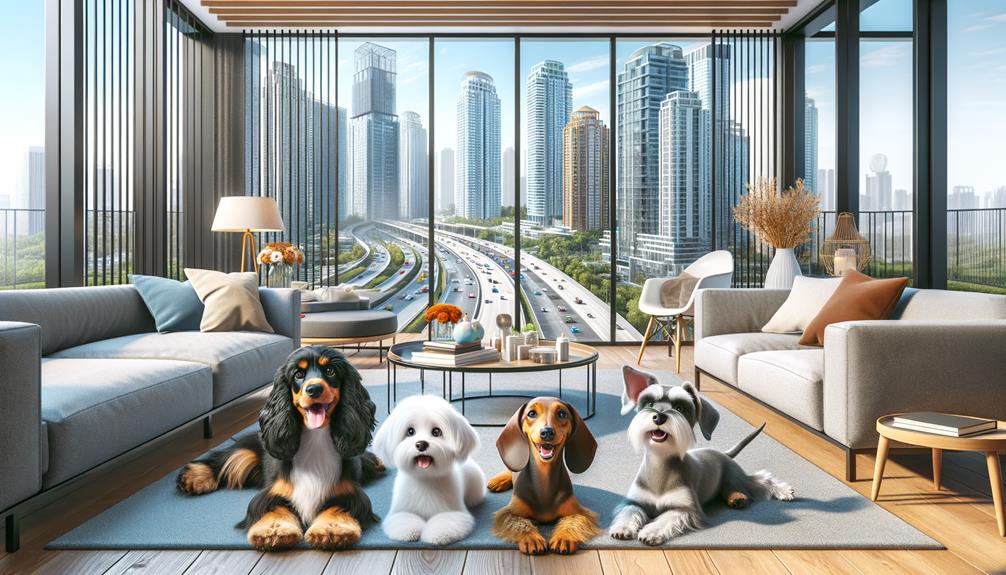You're thinking about adding a furry friend to your apartment life, but you're unsure which breed suits your lifestyle best. Isn't it a puzzle to choose from a myriad of breeds, each with its own unique traits? From Bichon Frises and their cheerful disposition to the calm and patient English Bulldogs, the ideal apartment dog is waiting for you. But, how do you decide which breed will be your perfect fit? Stick around, and let's explore this captivating topic together.
Key Takeaways
- Whippets, Basenjis, and French Bulldogs are quiet dog breeds suitable for apartments.
- English Bulldogs, Bulldogs, and Greyhounds are low-energy dog breeds ideal for apartment living.
- Bichon Frise, Shih Tzus, and Yorkshire Terriers are small dog breeds apt for apartment spaces.
- Dog breeds like Bichon Frise, Shih Tzus, and Pomeranians require regular grooming for apartment living.
- French Bulldogs, Boston Terriers, and Maltese require consistent and positive reinforcement training techniques in an apartment setting.
Understanding Apartment Dog Breeds
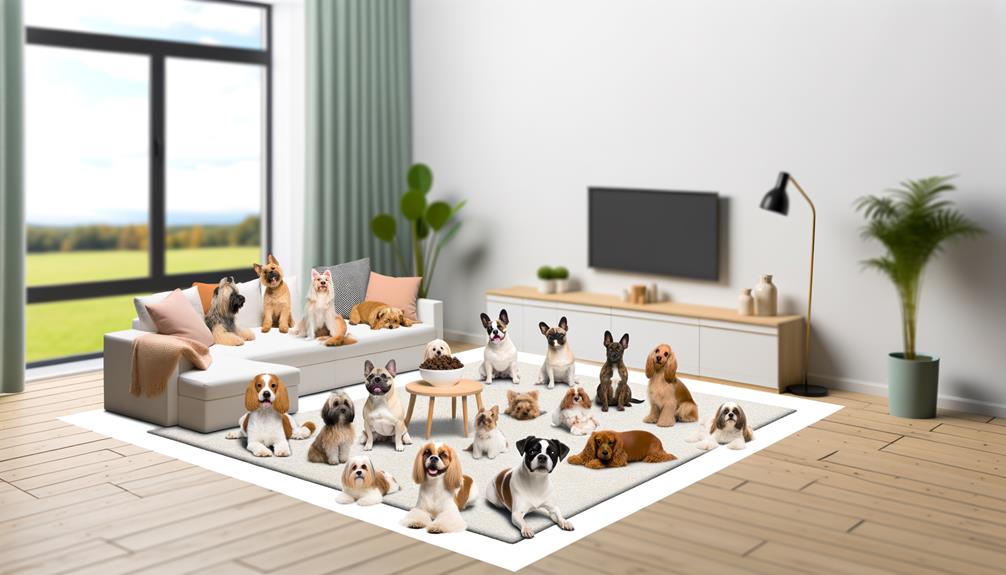
Before diving into the specifics, it's important to understand what makes certain dog breeds better suited for apartment living than others. You've got to consider two vital aspects: Dog Breed Noise Levels and Suitable Apartment Sizes.
Every dog breed has its unique traits, and noise level is a significant one. Some breeds are naturally louder, while others are quieter. If you're living in an apartment, you'd want to opt for dog breeds with lower noise levels. Your neighbors won't appreciate a dog that's constantly barking, and neither will you, especially if you're working or studying from home. Breeds like Whippets and Basenjis are known for their quiet nature, making them great apartment dogs.
Now, let's talk about apartment sizes. Not all dogs require a backyard to run around in, but some breeds do need more space than what an average apartment can offer. It's not just about the dog's size, but also their energy levels. For example, a small Jack Russell Terrier might be compact enough for your apartment, but its high energy levels mean it needs more space to burn off energy than a lazy English Bulldog. It's essential to pick a breed that suits both your lifestyle and your living conditions.
French Bulldogs: Loyal Companions
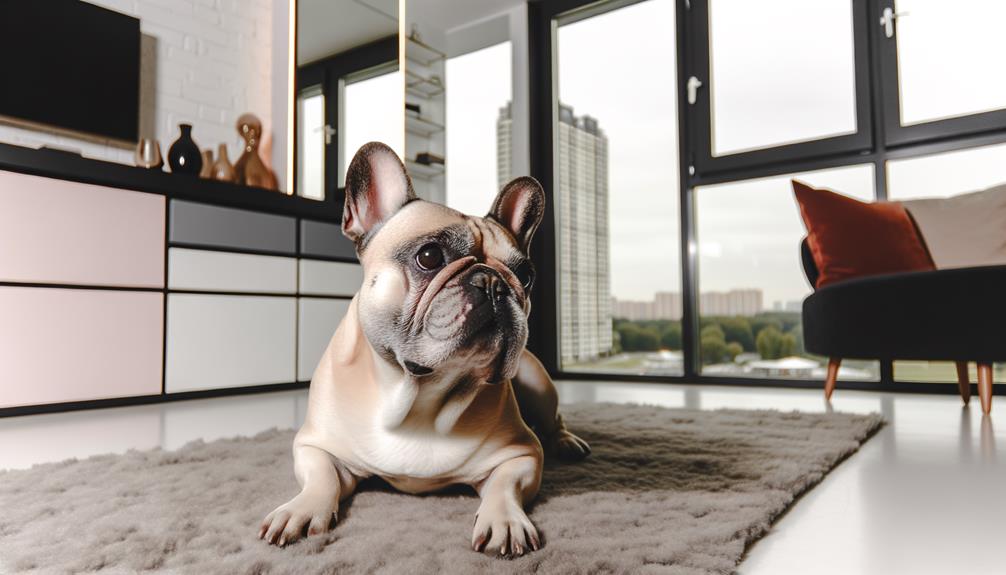
If you're looking for a loyal companion that's well-suited to apartment living, you can't go wrong with a French Bulldog. This breed's history is fascinating, originating from England in the 1800s as a miniature Bulldog. Later, French lace makers who migrated to France took these small Bulldogs with them, where they became popular and got the name 'French Bulldogs'.
French Bulldogs are compact, muscular dogs with a smooth coat, solid bone structure, and a pug-like face. They're known for their affectionate nature and even-temperedness, making them perfect companions. They're not big barkers, which is a bonus in apartment living, and they thrive on human interaction.
Training techniques for French Bulldogs should be gentle and consistent. They're intelligent and eager to please, so positive reinforcement works well. Short, fun sessions will keep your Frenchie engaged. They're not the most energetic dogs, but they still need daily walks for exercise and mental stimulation.
In short, French Bulldogs make great apartment pets. They're loyal, easy to train, and their quiet demeanor makes them ideal for close living quarters. However, they crave companionship, so they're best suited to those who can spend a lot of time with them.
Bichon Frise: Small and Friendly
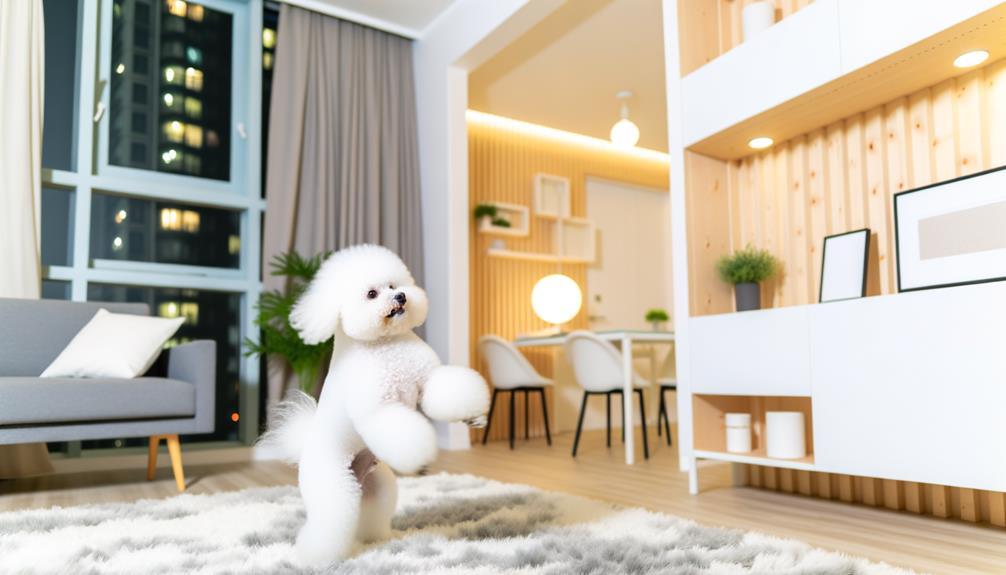
In the realm of small and friendly dog breeds perfect for apartment living, you'll surely fall in love with the Bichon Frise. These little bundles of joy are known for their cheerful disposition, making them a great addition to any home.
Bichon Frise grooming is an essential part of their care. With their curly, plush coat, regular brushing is a must to prevent matting and keep their fur looking its best. They don't shed much, so they're a good choice if you have allergies. However, they do require regular baths and professional grooming every few months to maintain their distinctive look.
When it comes to the Bichon Frise diet, it's important to feed them high-quality dog food. They're small, but they're also quite active and need a balanced diet to stay healthy. Be careful with treats, though. Bichon Frises can easily gain weight, so keep snacks to a minimum and make sure they get plenty of exercise.
Cavalier King Charles Spaniels: Gentle Souls
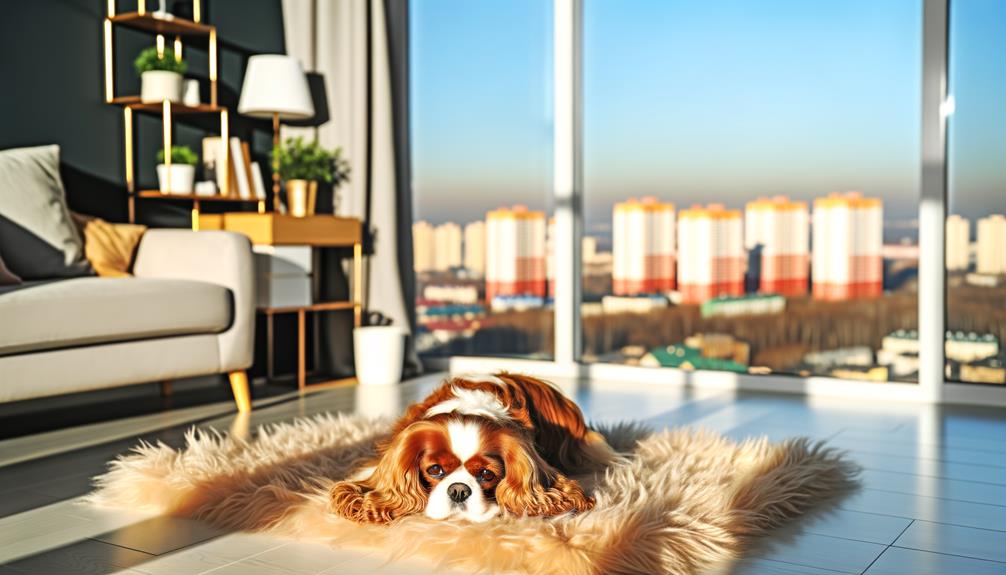
Moving on to Cavalier King Charles Spaniels, you'll find these dogs are complete gentle souls, perfect for apartment living. Born from a rich breed history, they've been adored by nobles and commoners alike for centuries. Their small size and quiet demeanor make them a great fit for apartment life.
Spaniel training isn't as daunting as it seems. These intelligent dogs are eager to please, making training relatively straightforward. Start with basic commands and gradually introduce more complex ones. They're particularly good at socializing, so introducing them to new people and environments will be a breeze.
Their affectionate nature is one of their most endearing traits. They're not just gentle; they're also incredibly loving, always ready to cuddle up with you after a long day. They're great with kids and other pets too, making them a wonderful addition to any family.
Despite their royal lineage, they're not high-maintenance dogs. Regular grooming and exercise will keep them happy and healthy. Remember, they're prone to certain health issues, so regular vet check-ups are a must.
Shih Tzu: The Royal Choice
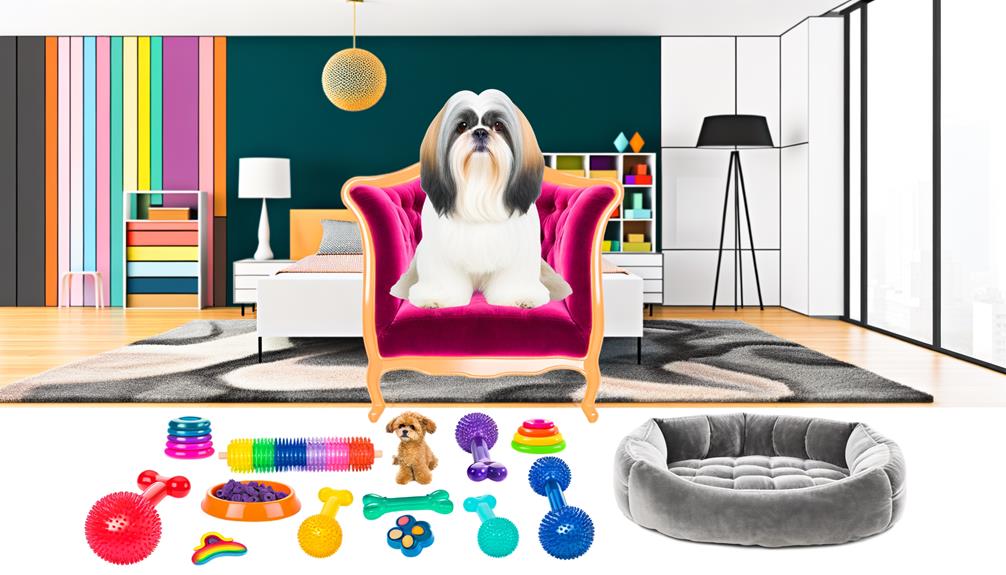
Switching gears from the gentle Cavalier King Charles Spaniels, let's turn our attention to another breed perfect for apartment living – the regal Shih Tzu. Known for its lavish coat and charming personality, this breed is a royal choice indeed.
Shih Tzu grooming is a crucial part of owning this breed. Their long, flowing coat requires daily brushing to prevent mats and tangles. You'll also need to regularly check their eyes and ears for any signs of infection. Regular grooming not only keeps your Shih Tzu looking its best, but it also helps you bond with your pet.
Equally important is the Shih Tzu diet. These dogs have a small but robust appetite, so you need to ensure they're getting the right nutrients in the right amounts. A balanced diet with high-quality protein, healthy fats, and some fruits and veggies will help keep your Shih Tzu healthy and happy.
In an apartment, a Shih Tzu can be a great companion. They're not overly active, so they don't need as much space as some larger breeds. However, they enjoy a good play session and a daily walk around the block. Bringing a Shih Tzu into your apartment life might just be the royal treatment you both deserve.
Pugs: Adorable and Affectionate
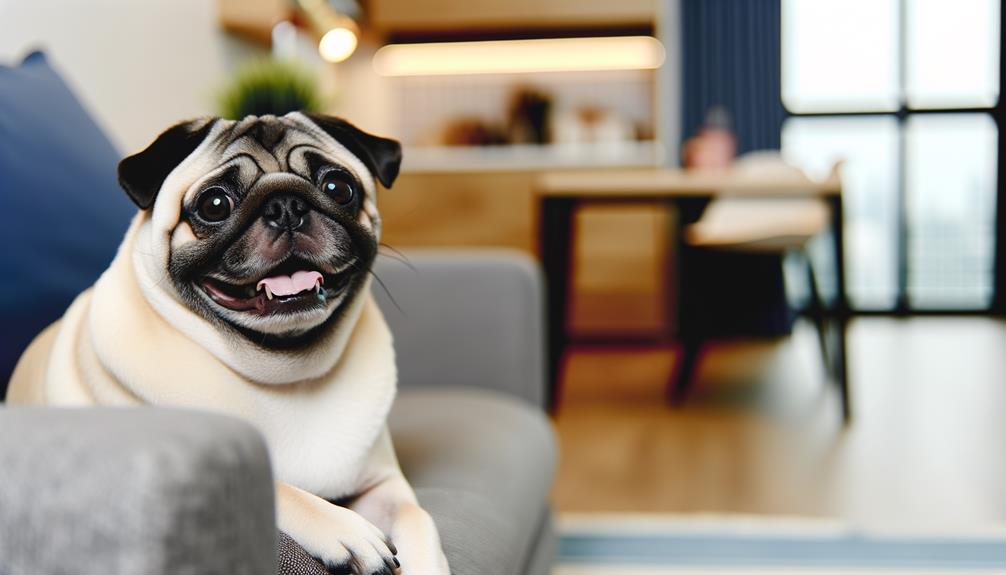
Now, let's turn our attention to pugs, those adorable and affectionate little pups.
You'll be keen to learn about their personality traits, the specific health considerations linked with this breed, and how well they adapt to apartment living.
Pugs: Personality Traits
Despite their small size, pugs pack a punch with their adorable and affectionate personality traits, making them a perfect companion in apartment living. They're known for their amusing antics and loving nature. These versatile pets adapt well to various environments, but they're especially comfortable in apartments.
Pug training is an essential part of their care, as their curious and playful nature requires guidance. However, their eagerness to please makes training easier. They're quite food-motivated, so remember that Pug nutrition is important. High-quality, balanced meals are key to keeping them healthy and active.
Pugs are sociable and enjoy the company of both humans and other pets. They're known to be gentle, making them great companions for children. Their loyal and patient personality further enhances their charm as apartment dwellers.
Health Considerations for Pugs
While pugs are generally robust, it's crucial to remain vigilant about their health as they're prone to certain breed-specific conditions. Pug allergies, for instance, can manifest as skin issues or respiratory problems. Regular vet visits and appropriate allergy medication can help control these symptoms.
Pug nutrition is another significant concern. Due to their small size and tendency to gain weight, you need to be mindful of their diet. Overfeeding can lead to obesity and related health issues. Provide a balanced diet with the right proportions of protein, fiber, and healthy fats.
In short, while pugs can be an excellent choice for apartment dwellers, they do require attentive care to ensure they stay healthy and happy.
Pugs and Apartment Living
If you're living in an apartment, you'll find pugs to be a delightful and affectionate companion. These little dogs are known for their love of people and their ability to adapt to different environments. Pug training isn't overly challenging as they're quite intelligent and eager to please.
One must remember that pug grooming is essential to keep their short, dense coat healthy and shiny. Regular brushing helps reduce shedding, especially in smaller living spaces. Pugs are also known for their moderate activity level, making them great for apartment living as they don't require large yards to burn off energy.
Boston Terriers: City Slickers
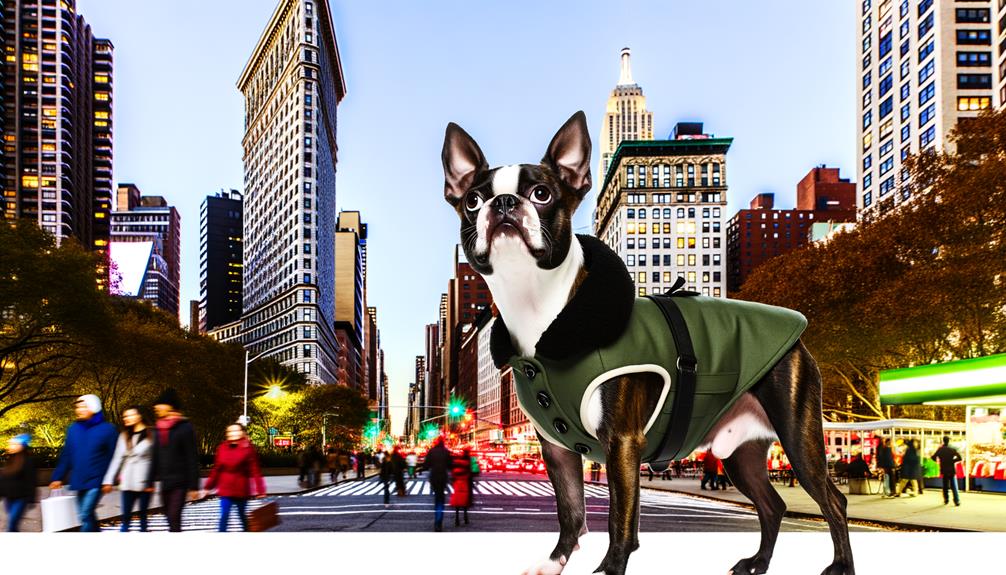
Known for their friendly demeanor and adaptable nature, Boston Terriers make excellent companions for apartment dwellers. As you dig into the Boston Terrier's history, you'll find that they were originally bred in the late 19th century in Boston, Massachusetts. These compact, well-muscled dogs were designed for city living, making them a perfect fit for your apartment lifestyle.
Terrier Training is relatively straightforward with these smart pups. They're eager to please and respond well to positive reinforcement. However, you need to be consistent with your training methods. Boston Terriers can be a bit stubborn, but don't let that deter you. With patience and perseverance, you'll find them to be quick learners.
Despite their city slicker reputation, Boston Terriers still need regular exercise. Daily walks and playtime will keep them healthy and happy. They're also sociable dogs, so they'll love meeting your neighbors. But remember, Boston Terriers are sensitive to extreme weather due to their short noses and thin coats, so dress them appropriately.
Dachshunds: Full of Character
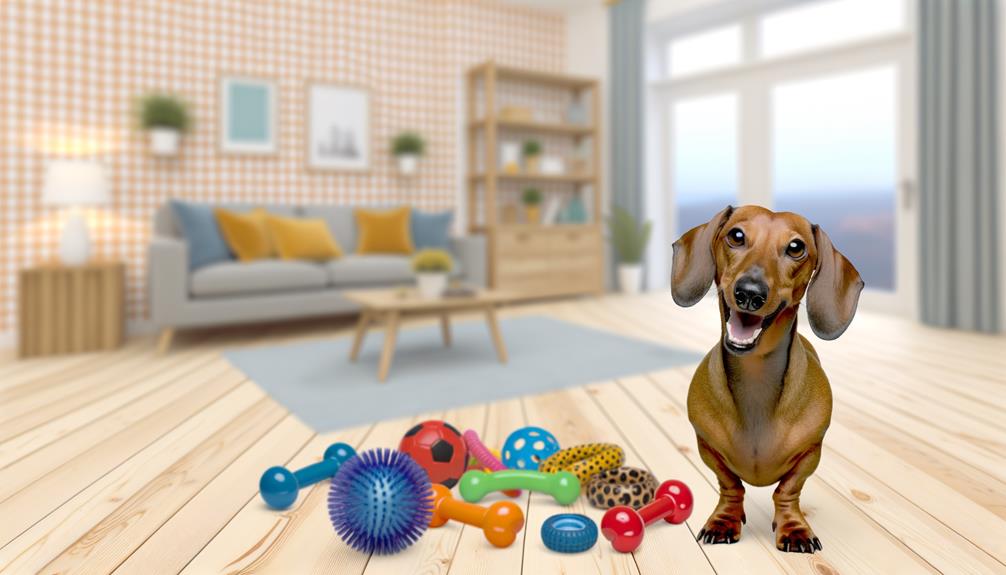
You're going to love learning about Dachshunds, a breed full of character. These little dogs are known for their unique personality traits that make them stand out in a crowd.
Let's discuss what it's like living in an apartment with a Dachshund.
Dachshunds: Personality Traits
One might be surprised to find that despite their small size, Dachshunds pack a big personality. These dogs are known for their tenacity and stubbornness, making Dachshund training a bit of a challenge. They're clever and quick to learn, but they'll test your patience by displaying their independent nature. Yet, with consistent training, you'll appreciate their intelligence and unique character.
Dachshund grooming is straightforward due to their short coat. However, don't be fooled by their size and low-maintenance coat, as they love rolling in the dirt, showcasing their playful and adventurous side.
Their bold personality combined with a touch of audacity, makes them quite entertaining. They're loyal to their owners and won't shy away from protecting their territory, showcasing their brave and protective nature. They're indeed small dogs with big hearts.
Apartment Living With Dachshunds
Despite their big personalities, Dachshunds can adapt well to apartment living, providing you give them enough exercise and mental stimulation. However, be aware of the 'Dachshunds' training challenges. They're known for their stubbornness, which can make training a bit tricky. Patience and consistency are key.
When considering Dachshunds and children interaction, they're generally good with kids, but early socialization is essential. Here are some tips for successful apartment living with Dachshunds:
- Regular walks and playtime to burn off energy
- Positive reinforcement training to tackle their stubborn nature
- Socialization with other dogs and people, including children
- Providing mental stimulation with toys and puzzles
English Bulldogs: Calm and Loving
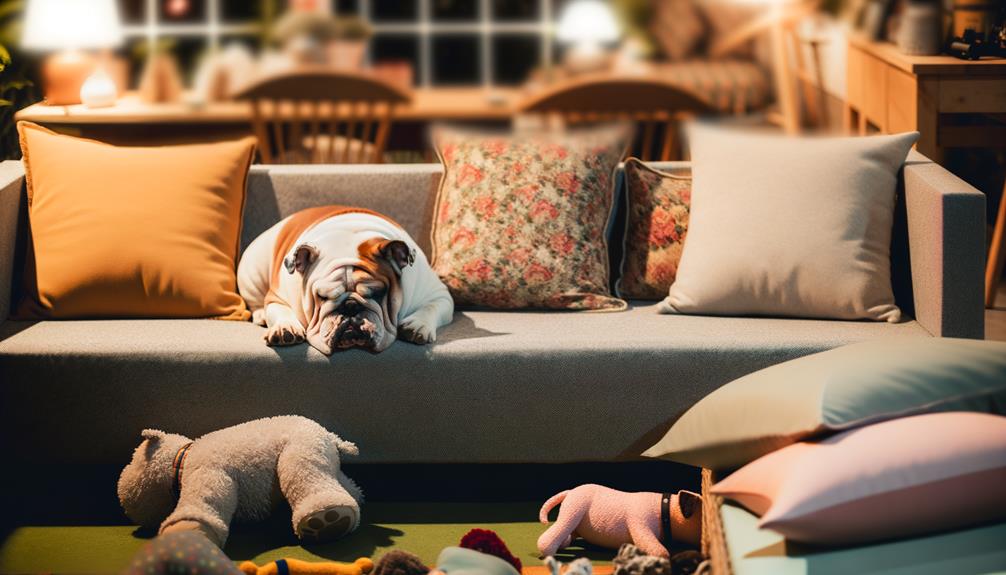
If you're seeking a calm and loving companion, an English Bulldog could be the perfect match for your apartment lifestyle. Their laid-back demeanor makes them perfect for smaller spaces, and they're known for their affectionate nature.
When it comes to training, English Bulldogs are known to be stubborn, but don't let this put you off. Effective Bulldog training tips include using positive reinforcement techniques. They're food-driven, so treats work well as rewards. Consistency is key with these dogs, so establish a routine and stick to it.
As for their diet, Bulldogs have a tendency to overeat. This means you'll need to keep a close eye on their food intake. Bulldog diet recommendations generally include a balanced mix of proteins, carbohydrates, and fats. They benefit from smaller, more frequent meals, rather than two large ones.
Despite their tough exterior, English Bulldogs are sensitive souls who thrive on love and attention. They're perfect for those who want a low-energy pet that'll happily snuggle on the couch with them. Remember, just like any breed, they require regular exercise to stay healthy and happy. Their loving temperament and easygoing nature make them an excellent choice for apartment dwellers.
Greyhounds: Surprisingly Lazy
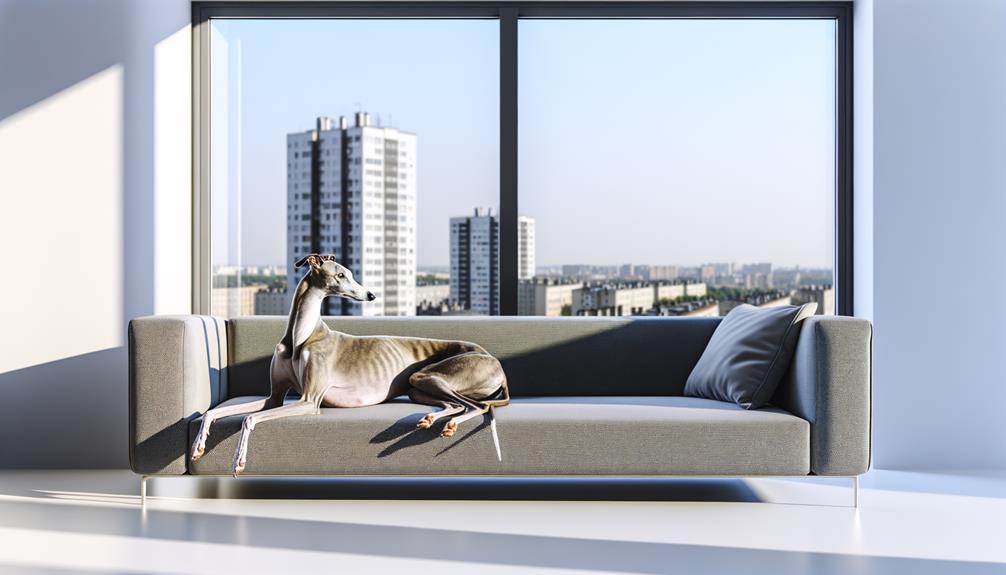
You mightn't guess it, but greyhounds are known for their love of napping. Despite their racing reputation, they don't require as much exercise as you'd think.
Let's explore how well these lazy sprinters adapt to apartment living.
Greyhounds' Love for Napping
Though they're known for their racing prowess, greyhounds actually spend most of their time napping, earning them a reputation as surprisingly lazy. But don't let this fool you into thinking they don't need care.
- Greyhound's dietary needs are specific due to their lean physique. High-quality protein is a must, but don't overfeed because they easily gain weight.
- Regular, gentle exercise is needed to keep them healthy, even if they'd rather nap.
- Greyhound grooming tips include frequent brushing due to their short hair, which sheds more than you'd expect.
- They're sensitive dogs, so provide a comfy sleeping area to accommodate their love for lounging.
Exercise Needs of Greyhounds
Despite their love for lounging, greyhounds still need daily exercise to maintain their health and happiness. Don't be fooled by their racing history; these dogs aren't always on the go. Yes, they're built for speed but they're not constantly in motion. A couple of short walks or a good run in a secure area is sufficient for their daily exercise.
As for their greyhound diet, it must be balanced and nutritional to support their energy levels. They're lean dogs with a quick metabolism, so they'll need a diet high in quality proteins and fats. Remember, they're not the high-energy dogs their racing history might suggest. Though they love a good sprint, they're surprisingly lazy, perfectly happy to spend most of their day relaxing.
Greyhounds' Apartment Adaptability
Given their seemingly lazy nature, greyhounds adapt remarkably well to apartment living. Despite their racing background, these dogs are known for their calm and relaxed temperament, which makes them perfect for smaller spaces.
Here's why the greyhound temperament and lifestyle make them suitable for apartment living:
- They're generally quiet, causing minimal disturbance to neighbors.
- Their short coat requires minimal grooming, making greyhound grooming an easy task.
- They're known to be couch potatoes, loving nothing more than lounging around with their owners.
- They require less exercise than you might think, a few decent walks a day are enough.
Chihuahuas: Tiny but Mighty
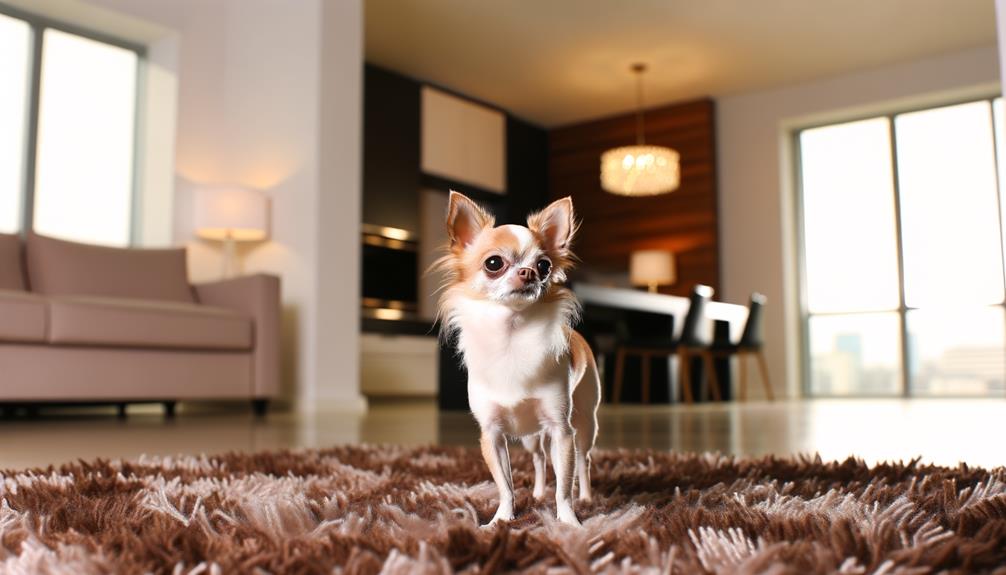
Don't let their small stature fool you, Chihuahuas pack a big personality into a tiny package, making them a mighty choice for apartment living. Despite their size, they're full of energy and require a fair amount of exercise. It's important to meet the Chihuahuas' exercise needs with a short walk daily, or some fun indoor playtime.
When it comes to grooming, Chihuahuas are pretty low-maintenance but there are still some Chihuahuas' grooming tips to keep in mind. They've a short coat that's easy to care for. Brush them weekly to keep their coat shiny and healthy. Don't neglect their dental hygiene either. Brush their teeth at least two to three times a week to avoid any dental problems.
Chihuahuas are known for their loyalty and can be quite protective of their owners. They're great for a single person or a couple who want a small but mighty companion. With their alert nature, they also make excellent watch dogs. Just remember, they demand a lot of love and attention, so be sure you're ready for the commitment.
Pomeranians: Small and Fluffy
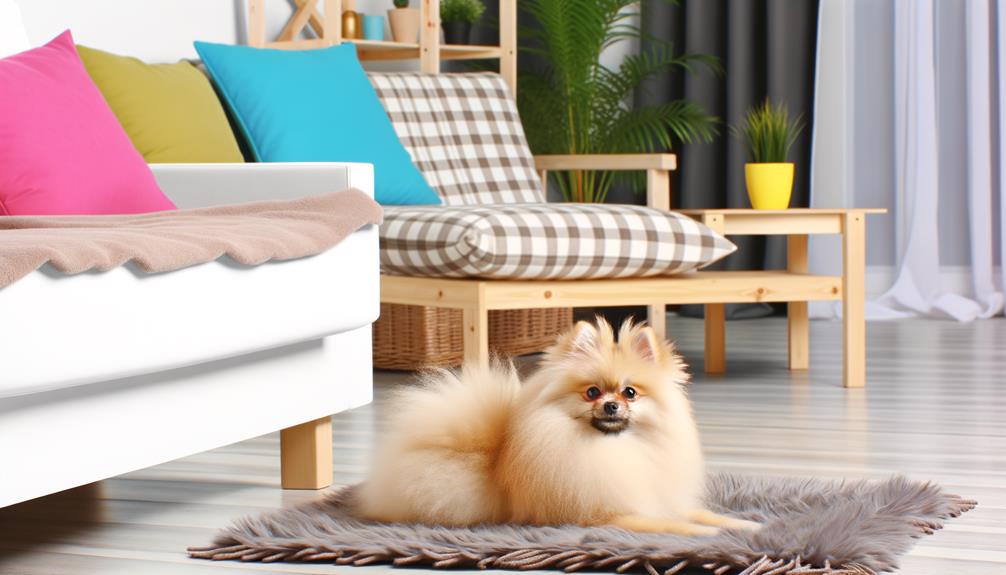
If you're looking for a small, fluffy, and lively pet, then a Pomeranian could be your perfect match for apartment living. These pint-sized pooches are known for their playful personalities and their adorable, fluffy coats. They're perfect for apartment living due to their small size and adaptable nature.
When it comes to Pomeranian grooming, it's important to know that their thick double coat requires regular brushing to keep it looking its best. On the other hand, Pomeranian training can be a bit of a challenge due to their stubborn nature, but with patience and positive reinforcement, it's definitely achievable.
Here are some quick facts about Pomeranians that might interest you:
- Pomeranians are known for their loud bark, which can be curbed with proper training.
- These dogs are incredibly intelligent and can learn tricks easily.
- Despite their small size, they're quite active and require regular exercise.
- Pomeranians are very loyal and tend to bond closely with their owners.
In short, if you're up for the grooming and training, a Pomeranian can be a wonderful addition to your apartment life.
Yorkshire Terriers: Petite and Sassy
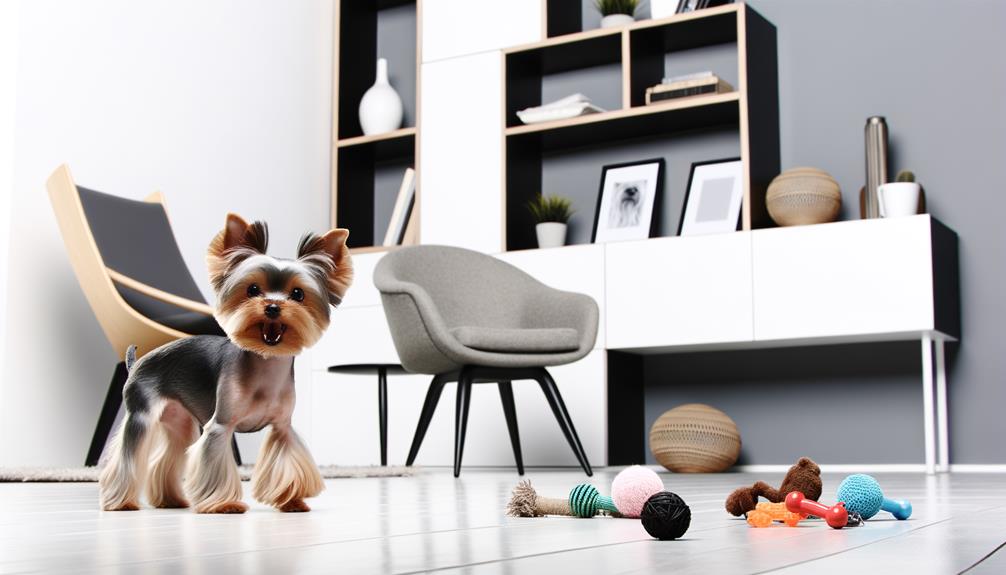
If you're searching for a petite but sassy apartment companion, look no further than the Yorkshire Terrier. Known for their vibrant personality, these dogs require specific conditions to thrive.
Let's talk about their unique traits, ideal living conditions, and necessary health and care tips.
Yorkshire Terriers' Personality Traits
Known for their feisty spirit and petite size, Yorkshire Terriers pack a lot of personality into a small package. Their bold and tenacious demeanor often makes them seem larger than they actually are.
Your Yorkie's personality traits can be shaped by your Terrier Grooming and Training Techniques. While grooming, Yorkies exhibit patience and tranquility. During training, they're intelligent and quick learners.
Here are some key personality traits:
- Confident: Yorkies aren't afraid to stand their ground.
- Intelligent: They pick up new commands and tricks quickly.
- Loving: Despite their sass, Yorkies have a deep capacity for love.
- Independent: They're happy to explore and don't always need constant attention.
Ideal Living Conditions
Considering these personality traits, let's explore why Yorkshire Terriers, with their petite size and sassy demeanor, are a perfect match for apartment living. Their small stature allows for optimal space utilization, making even a studio feel like a mansion for these petite pooches. They won't require a large yard or wide-open spaces to roam, so you don't need to worry about them feeling cramped.
Noise considerations are also key when choosing a dog for apartment living. Luckily, Yorkies, while energetic, aren't typically loud barkers. They'll express their sass through playful antics, not constant noise, making them the ideal roommate for you and considerate to your neighbors. So, if you're living in an apartment, a Yorkie could be just the companion you need.
Health and Care Tips
Caring for your petite and sassy Yorkie isn't a daunting task, but it does require a certain level of commitment to ensure their health and happiness. Here are some important care tips:
- Nutrition Essentials: Feed your Yorkie high-quality dog food that's rich in proteins, vitamins, and good fats. Avoid food with artificial additives.
- Grooming Techniques: Regular brushing is needed to keep their long, silky coat tangle-free. Professional grooming may be required.
- Regular Exercise: Despite their size, Yorkies are energetic. Ensure they get sufficient physical and mental stimulation.
- Routine Vet Check-ups: Regular vet visits help catch potential health issues early.
Maltese: Elegant and Charming
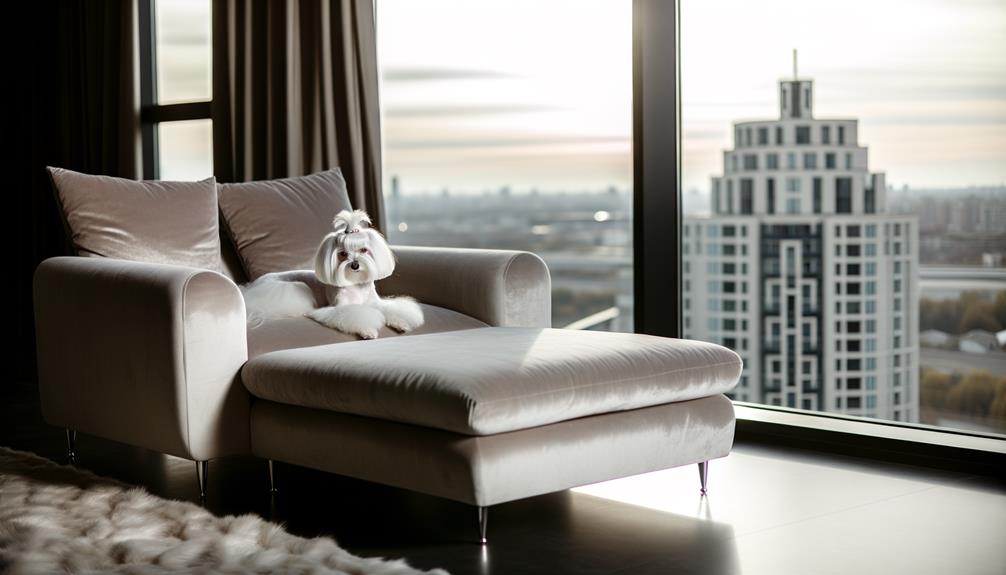
If you're looking for an elegant and charming breed, you'll find the Maltese is a perfect match for apartment living. This small, lively dog is known for its beautiful white coat, playful nature, and love for its human companions. But, like any breed, it comes with its own unique set of needs. Particularly, Maltese grooming needs and training tips should be considered.
Maltese grooming needs are fairly high due to their long, silky coats. Regular brushing and bathing will keep their hair healthy and free from mats. You'll also need to regularly clean their eyes to prevent tear staining. Don't be intimidated; with a bit of routine, it becomes a bonding time with your pet.
As for Maltese training tips, these dogs are intelligent and eager to please, making them relatively easy to train. However, they can be stubborn at times. Positive reinforcement methods work best. Remember to be consistent and patient. Training should be fun for both of you.
Factors to Consider When Choosing
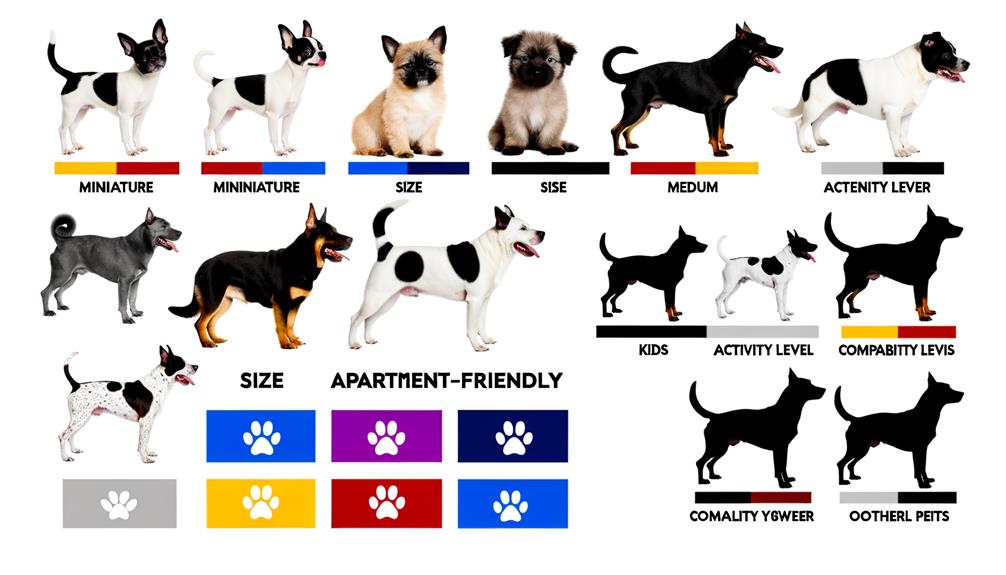
When choosing a dog breed for apartment living, you'll need to weigh several key factors including the dog's size, temperament, exercise needs, and grooming requirements.
Consider these points:
- Size: Small to medium-sized breeds are often more suited for apartment living. They require less space and are easier to manage in confined spaces. This is where space optimization comes into play. A smaller dog won't feel as cramped in a smaller apartment as a larger breed might.
- Temperament: Some breeds adapt better to living in apartments than others. Breeds that are known to be calm, quiet, and less active are usually a better fit. This is crucial for noise management, as you don't want a loud, anxious dog disturbing your neighbors.
- Exercise Needs: Even in an apartment, your dog will still require daily exercise. You'll need to make sure you can provide this, whether it's through walks, playtime, or trips to the local dog park.
- Grooming Requirements: Some breeds require more grooming than others. If you're not able to commit to regular grooming, a low-maintenance breed might be a better choice for you.
Choosing wisely will ensure a happy and harmonious living situation for you and your furry friend.
Frequently Asked Questions
Can Apartment Dogs Still Enjoy Regular Outdoor Activities?
Absolutely, you can still engage your dog in regular outdoor activities. Just remember dog park etiquette. If the weather's bad, there's always indoor exercise options. It's all about balance and keeping your furry friend active.
Are These Breeds Suitable for Households With Children or Other Pets?
Absolutely, many child friendly breeds are also great for multi pet households. It's important to introduce them properly and ensure they're socialized. Always supervise interactions until you're confident they're getting along well.
What Are Some Common Health Issues Associated With These Dog Breeds?
You're asking about common health issues tied to certain dog breeds. Breeding implications can result in genetic predispositions to conditions like hip dysplasia, heart disease, or eye problems among these breeds.
Which of These Breeds Are Most Suitable for First-Time Dog Owners?
Considering your first-time dog owner status, you'll find breeds with fewer training challenges ideal. Consider adopting shelter dogs suitable for apartments, like the Bichon Frise or Cavalier King Charles Spaniel. They're easy to train and adapt well.
What Are the Grooming Needs of These Apartment Dog Breeds?
You'll find different grooming needs among these breeds. Some require professional grooming, others you can handle with different grooming products. Celebrity dog groomers often share tips for maintaining your pet's coat at home.
Conclusion
So, you're on the hunt for the perfect apartment dog. Whether it's the loyal French Bulldog, the small and friendly Bichon Frise, or the sassy Yorkshire Terrier, there's a breed to suit your lifestyle and living space.
Don't forget the importance of regular grooming, consistent training, and adequate exercise.
Choosing the right breed and caring for them properly ensures a happy, harmonious life together in your cozy apartment.

